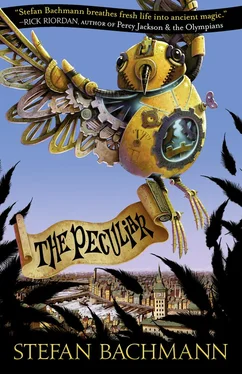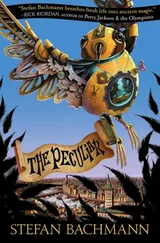Bath became their home in this new country. It grew back a dark place, pressing up out of the rubble. The place where the highway had appeared, where everything had been utterly destroyed, became New Bath, a knot of houses and streets more than five hundred feet high, all blackened chimneys and spidery bridges wound into a ball of stinking, smoking dross.
As for the magic the faeries had brought with them, Parliament decided it was something of an affliction that must be hidden under bandages and ointments. A milkmaid in Trowbridge found that whenever a bell rang, all the enchantments around her would cease, and the hedgerows would stop their whispering, and the roads would lead only to where they had led to before, so a law was passed that commanded all the church bells in the country to toll every five minutes instead of every quarter hour. Iron had long been known as a sure protection against spells, and now little bits of it were put into every-thing from buttons to breadcrumbs. In the larger cities, fields were plowed up and trees chopped down because it was supposed that faeries could gather magic from the leaves and the dewdrops. Abraham Darby famously hypothesized in his dissertation The Properties of Air that clockwork acted as a sort of antidote to the unruly nature of the fay, and so professors and physicians and all the great minds turned their powers toward mechanics and industry. The Age of Smoke had begun.
And after a time the faeries were simply a part of England, an inseparable part, like the heather on the bleak gray moors, like the gallows on the hilltops. The goblins and gnomes and wilder faeries were quick to pick up English ways. They lived in English cities, coughed English smoke, and were soon no worse off than the thousands of human poor that toiled at their side. But the high faeries—the pale, silent Sidhe with their fine waistcoats and sly looks—they did not give in so easily. They could not forget that they had once been lords and ladies in great halls of their own. They could not forgive. The English might have won the Smiling War, but there were other ways to fight. A word could cause a riot, ink could spell a man’s death, and the sidhe knew those weapons like the backs of their hands. Oh yes, they knew.
Contents Cover Title Page Dedication Prologue Chapter I: The Most Prettiest Thing Chapter II: A Privy Deception Chapter III: Black Wings and Wind Chapter IV: Nonsuch House Chapter V: To Invite a Faery Chapter VI: Melusine Chapter VII: A Bad One Chapter VIII: To Catch a Bird Chapter IX: In Ashes Chapter X: The Mechanicalchemist Chapter XI: Child Number Ten Chapter XII: The House and the Anger Chapter XIII: Out of the Alley Chapter XIV: The Ugliest Thing Chapter XV: Goblin Market Chapter XVI: Greenwitch Chapter XVII: The Cloud That Hides the Moon Chapter XVIII: The Peculiar Copyright Конец ознакомительного фрагмента. Текст предоставлен ООО «ЛитРес». Прочитайте эту книгу целиком, купив полную легальную версию на ЛитРес. Безопасно оплатить книгу можно банковской картой Visa, MasterCard, Maestro, со счета мобильного телефона, с платежного терминала, в салоне МТС или Связной, через PayPal, WebMoney, Яндекс.Деньги, QIWI Кошелек, бонусными картами или другим удобным Вам способом. About the Publisher
 ARTHOLOMEW Kettle saw her the moment she merged into the shadows of Old Crow Alley—a great lady dressed all in plum-colored velvets, striding up the muddy street with the bearing of a queen. He wondered if she would ever leave again. In the corpse man’s barrow perhaps, or in a sack, but probably not on her own two feet.
ARTHOLOMEW Kettle saw her the moment she merged into the shadows of Old Crow Alley—a great lady dressed all in plum-colored velvets, striding up the muddy street with the bearing of a queen. He wondered if she would ever leave again. In the corpse man’s barrow perhaps, or in a sack, but probably not on her own two feet.
Bartholomew closed the book he had been reading and pressed his nose against the grimy window, watching her progress down the alley. The faery slums of Bath were not kind to strangers. One moment you could be on a bustling thoroughfare, dodging tram wheels and dung piles, and trying not to be devoured by the wolves that pulled the carriages, and the next you could be hopelessly lost in a maze of narrow streets with nothing but gaunt old houses stooping overhead, blocking out the sky. If you had the ill luck to meet anyone, chances were it would be a thief. And not the dainty sort, like the thin-fingered chimney sprytes of London. Rather the sort with dirt under his nails and leaves in his hair, who, if he thought it worthwhile, would not hesitate to slit your throat.
This lady looked very worthwhile. Folks killed for less, Bartholomew knew. If the half-starved corpses he had seen dragged from the gutter were anything to go by, folks killed for much less.
She was so tall, so strange and foreign in her finery; she seemed to fill every nook of the murky passage. Long gloves the color of midnight covered her hands. Jewels glimmered at her throat. A little top hat with an enormous purple flower in it sat on her head. It was perched at an angle so that it cast a shadow over her eyes.
“Hettie,” Bartholomew whispered, without turning from the window. “Hettie, come look.”
Feet pattered in the depths of the room. A little girl appeared next to him. She was too thin, her face all sharp bones and pale skin, tinged blue from lack of sunlight. Ugly, like him. Her eyes were huge and round, black puddles collecting in the hollows of her skull. The tips of her ears were pointed. In a pinch Bartholomew might still pass as a human child, but not Hettie. There was no mistaking the faery blood in her veins. For where Bartholomew had a mess of chestnut hair growing out of his scalp, Hettie had the smooth, bare branches of a young tree.
She pushed a wayward twig out of her eyes and let out a little gasp.
“Oh, Barthy,” she breathed, clutching at his hand. “It’s the most prettiest thing I’ve seen in my whole life.” He went onto his knees next to her, so that both their faces were just peeking over the worm-eaten wood of the sill.
Pretty indeed, but there was a wrongness about the lady outside. Something dark and unsettled. She carried no baggage or cloak, not even a parasol to shield herself from the heat of late summer. As if she had stepped from the shadowy hush of a drawing room directly into the heart of Bath’s faery district. Her gait was stiff and jerking, as though she didn’t exactly know how to work her appendages.
“What d’you suppose she’s doing here?” Bartholomew asked. He began to gnaw slowly at his thumbnail.
Hettie frowned. “I dunno. She might be a lady thief. Mummy says they dress pretty. But isn’t she far too splendid for a thief? Doesn’t she look like …” Hettie glanced at him, and a flicker of fear passed behind her eyes. “Like she’s looking for something?”
Bartholomew stopped chewing his nail. He peered at his sister. Then he squeezed her hand. “She’s not looking for us, Het.”
But even as he said it, he felt the uneasiness curl like a root in his stomach. She was looking for something. Or someone. Her eyes, half hidden in the shadow of her hat, were searching, studying the houses as she moved past them. When her gaze fell on the house they lived in, Bartholomew ducked down under the sill. Hettie was already there. Don’t get yourself noticed and you won’t get yourself hanged. It was perhaps the most important rule for changelings. It was a good rule.
The lady in the plum-colored dress walked the full length of the alley, all the way to the corner where it wormed into Black Candle Lane. Her skirts dragged over the cobbles, becoming heavy with the oily filth that covered everything, but she didn’t seem to care. She simply turned slowly and made her way back down the alley, this time inspecting the houses on the other side.
Читать дальше

 ARTHOLOMEW Kettle saw her the moment she merged into the shadows of Old Crow Alley—a great lady dressed all in plum-colored velvets, striding up the muddy street with the bearing of a queen. He wondered if she would ever leave again. In the corpse man’s barrow perhaps, or in a sack, but probably not on her own two feet.
ARTHOLOMEW Kettle saw her the moment she merged into the shadows of Old Crow Alley—a great lady dressed all in plum-colored velvets, striding up the muddy street with the bearing of a queen. He wondered if she would ever leave again. In the corpse man’s barrow perhaps, or in a sack, but probably not on her own two feet.










